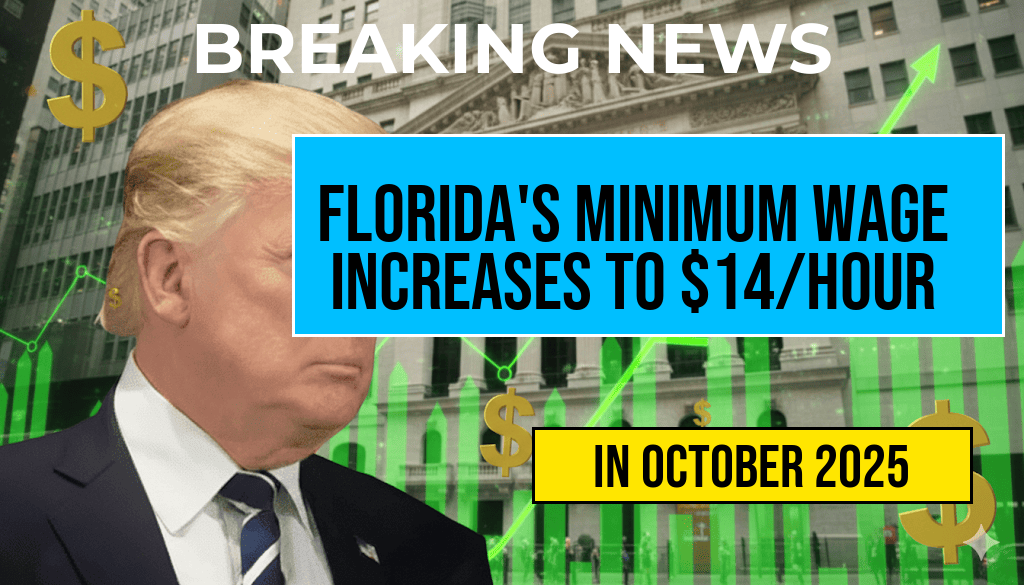On January 1, 2024, Florida will implement a new minimum wage of $14 an hour, a significant increase from the previous rate of $13. This change is expected to enhance the annual earnings of full-time workers by approximately $2,080, bringing the total annual income for a 40-hour workweek to around $29,120. The wage hike, part of a gradual increase initiated by a voter-approved amendment in 2020, is designed to improve the standard of living for many Floridians, particularly in the face of rising inflation and living costs. Advocates argue that the increase will not only benefit employees but also stimulate local economies as workers have more disposable income to spend. However, some business owners express concerns about the potential impact on operating costs and hiring practices.
The Path to $15: Florida’s Minimum Wage Journey
The gradual increase in Florida’s minimum wage began with the passage of Amendment 2 in November 2020, which mandated a raise to $15 per hour by 2026. The new $14 rate is a step towards achieving that target. As the state continues to grapple with economic challenges, including inflation, this adjustment aims to provide relief and support for low-wage workers across various sectors.
Economic Impacts of the Wage Increase
The wage increase is expected to have multiple effects on Florida’s economy:
- Increased Purchasing Power: Full-time workers earning $14 an hour will see a boost in their financial capabilities, enabling them to afford necessities and contribute more to the local economy.
- Support for Small Businesses: With more money in their pockets, consumers are likely to spend more at local businesses, helping to stimulate economic growth.
- Potential Job Market Changes: Some businesses may respond to the wage hike by adjusting staffing levels or increasing prices, which could impact employment opportunities.
Reactions from Businesses and Workers
The response to the new minimum wage has been mixed. While many workers welcome the increased pay, some business owners express apprehension about the potential for increased operational costs. According to a survey conducted by the Florida Chamber of Commerce, nearly 60% of small business owners are concerned about the impact of the wage increase on their ability to hire and maintain staff. Conversely, labor advocates argue that higher wages can lead to greater employee satisfaction and retention, ultimately benefiting businesses in the long run.
Comparative Analysis of Minimum Wages Across States
Florida’s new minimum wage is competitive compared to other states. Here’s a brief comparison:
| State | Minimum Wage | Annual Earnings (40 hrs/week) |
|---|---|---|
| Florida | $14.00 | $29,120 |
| California | $15.50 | $32,240 |
| New York | $15.00 | $31,200 |
| Texas | $7.25 | $15,080 |
Future Projections
As Florida moves closer to the $15 minimum wage target set for 2026, stakeholders will be closely monitoring the effects of the current wage increase. The state’s economy, labor market, and consumer behavior will all play crucial roles in determining the long-term implications of this policy change. Analysts predict that the next two years will be pivotal in establishing a balanced approach that supports both workers and businesses.
Further Resources
For more information on minimum wage laws and their impacts, you can visit:
Frequently Asked Questions
What is the new minimum wage in Florida?
The new minimum wage in Florida is $14/hour.
How much will full-time workers earn annually with the new minimum wage?
Full-time workers will see an increase of $2,080 in their annual earnings due to the new minimum wage.
When did the new minimum wage take effect in Florida?
The new minimum wage took effect on January 1, 2023, as part of a gradual increase plan.
How does this increase impact part-time workers?
While the article focuses on full-time workers, part-time workers will also benefit from the increase in minimum wage, earning more per hour worked.
What are the future projections for Florida’s minimum wage?
Florida’s minimum wage is set to continue increasing annually until it reaches $15/hour in 2026, following the approved amendment.













